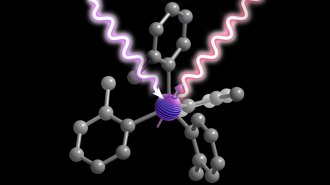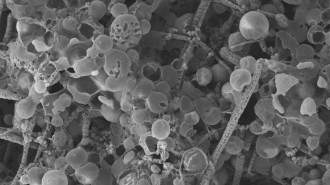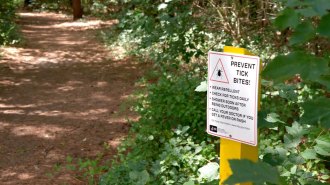Uncategorized
-
 Earth
EarthA drop in CFC emissions puts the hole in the ozone layer back on track to closing
After a recent bump in illicit CFC-11 pollution, emissions of the ozone-destroying chemical are back down to pre-2013 levels.
-
 Life
LifeA reeking, parasitic plant lost its body and much of its genetic blueprint
The Sapria himalayana flower's extreme parasitic lifestyle inside the body of its host has left a bizarre imprint on its genome.
By Jake Buehler -
 Quantum Physics
Quantum Physics‘Designer molecules’ could create tailor-made quantum devices
Scientists are making molecules suited to a variety of quantum tasks by building them up, atom by atom.
-
 Earth
EarthThree things to know about the disastrous flood in India
The flood, which killed at least 30 people, may have been caused by a collapsing glacier or a landslide, with climate change possibly playing a role.
-
 Earth
EarthFossil mimics may be more common in ancient rocks than actual fossils
Evidence of early life may be harder to preserve than pseudofossils — structures that form abiotically but resemble living remnants.
-
 Science & Society
Science & Society‘Under a White Sky’ explores whether we must tinker with nature to save it
In ‘Under a White Sky’, Elizabeth Kolbert examines the technological innovations we might need to save a planet we are actively destroying.
-
 Earth
EarthThe birth of a lightning bolt was caught on video
High-speed imagery shows the formation of an electrical connection between opposing currents, offering new insight into how these flashes form.
-

-

Should corporations get access to our brains?
Editor in chief Nancy Shute reflects on how reader feedback shaped the cover story about privacy and neurotechnology. She also highlights the next theme in our Century of Science project.
By Nancy Shute -
 Health & Medicine
Health & MedicineHow coronavirus variants may drive reinfection and shape vaccination efforts
New coronavirus variants could infect people who have already recovered from COVID-19 or been vaccinated, but there are still many unknowns.
-
 Health & Medicine
Health & MedicineThe animals that ticks bite in the U.S. South can impact Lyme disease spread
Ticks in the north primarily attach to mice, which do a good job of infecting them with Lyme bacteria, setting up the spread to people.
-
 Astronomy
AstronomyTwo exoplanet families redefine what planetary systems can look like
The TRAPPIST-1 and TOI-178 systems, both home to multiple bunched-up planets, have densities and orbits that defy expectations.